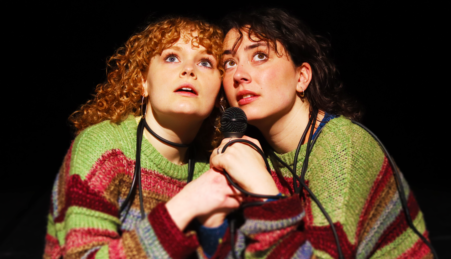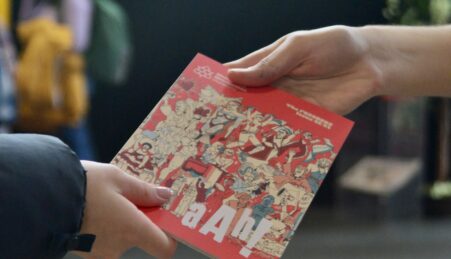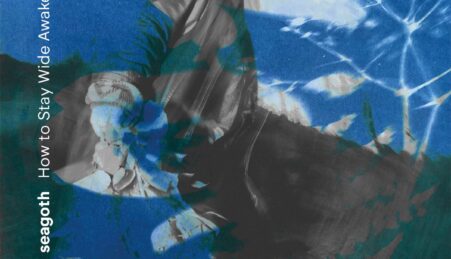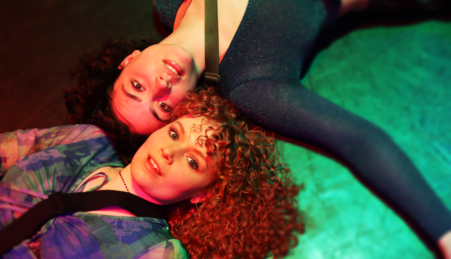
Humanity Hallows Issue 6 Out Now
Pick up your copy on campus or read online
By Emily Oldfield
Number 70 Oxford Street transformed into a hub of club culture for a special event at the weekend: an exhibition entitled ‘It’s Alright: A Celebration of Manchester’s Rave Heritage 1985-1995’.
Co-ordinated by Manchester Met Senior Lecturer in German Dr Beate Peter, the exhibition was part of her extensive study of rave culture. It also marked the start of the Lapsed Clubber Heritage Map, a Heritage Lottery-funded project and digital resource documenting public memories and moments of Manchester’s rave culture, led by Dr Peter in collaboration with Manchester District Music Archive.
Dr Peter told us: “I did my PhD in electronic dance music… and everyone said – are you mad? Ultimately I am interested in what electronic dance music does to people, to communities. This is an event therefore designed for you to share your memories with us.”
The afternoon was accompanied by live DJ sets from acclaimed icons, with Andy Harris playing from 2 till 4pm, followed by Rob Fletcher, Hewan Clarke and Aniff Anikola. The entertainment provided a rousing soundtrack to the range of events available, which included a panel discussion that explored the emergence of rave culture, the launch of the new website of Manchester District Music Archive and a number of immersive experiences.
The experiences explored concepts associated with rave culture and made creative use of multiple rooms inside the Number 70 Oxford Street building. Spaces included a ‘clubs’ section, recreating a rave, a ‘drugs’ room featuring free tea, coffee, wine and the opportunity to talk anonymously about drug use alongside club culture, a ‘hugs’ area with a focus on physical closeness when raving and the chance for a massage, plus a ‘mugs’ room where people could share ‘getting ready’ rituals.
A highlight of the afternoon was a panel discussion that featured people who had experienced the emergence and subsequent rise of rave culture during the 1980s and 90s. Joining Dr Peter was radio producer Kath McDermott, DJ Hewan Clarke, record seller Russ Marland and producer Aniff Anikola.
There were a number of reflections on the cultural landscape of Manchester during the panel discussion. Aniff Anikola told us: “It’s a mental music metropolis where you are one person away from achieving anything you want to do.” Recurrent themes were the communal nature of club culture, the change of genres during the 1980s and the connection between raving and oppressed minorities.
Hewan Clarke, a DJ in the area for over 40 years and friend of the late Tony Wilson, said: “For me, in the middle of the 80s something started to happen – hip hop and people talking not singing on records. When it comes to ‘House’ music… I remember the moment in Playpen,(a clubnight), when we (the DJs) all came in with our record boxes; DJs went through each other’s boxes back then to check out each other’s record collections and see what we didn’t have. I remember picking up a record – we didn’t have a name for it – but it was a rude title and a genre that sounded like nothing else. Mike Shaft came up with the name ‘garage’ because we knew it was played in garage club in America – and we thought how are we going to fit this in? It was a constant beat. Can people dance to this? It was actually surprisingly popular.”
Both Anikola and Kath McDermott reflected on the linkages between gay, black and other oppressed minority groups with rave culture. Anikola discussed how “at clubnights black music was never allowed on Friday or Saturday –it had to be early weeknights – because black kids didn’t drink beer,” whilst Mcdermott talked of her own experiences of the Queer scene, explaining “gay people started being at the forefront and there grew the image of Gaychester. Clubs like Flesh and Paradise Factory were very important in that.”
The discussion closed with an exploration of what has changed in club culture, with record seller Russ Marland reflecting, “I miss the naivety and innocence the fact that no one knew what we were doing. But what people do now is still precious to them… we can’t take that from them. In terms of current places, The White Hotel is the essence of ’88 now, and shows that there are still some good venues around.”
A later afternoon session also marked the launch of Manchester District Music Archive’s new website with Abigail Ward, an award-winning curator, writer and DJ with over fifteen years’ experience in the music industry. It added to the celebratory and inclusive feel of the event, with attendees also encouraged to download a specially-designed ‘It’s alright’ app on their phone to share their experiences.






Leave a reply